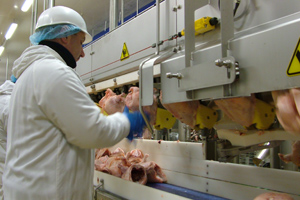USDA changes HACCP reassessment of poultry products

Companies that produce “comminuted” poultry, which now includes ground chicken and mechanically separated chicken, will be required to reassess their Hazard Analysis and Critical Control Points (HACCP) plans, the US Department of Agriculture’s Food Safety and Inspection Service announced in the Federal Register.
According to the notice, the HACCP reassessment, which establishments must conduct in the next 90 days, must take into account recent Salmonella outbreaks associated with consumption of comminuted not-ready-to-eat (raw) turkey products.
“The chicken industry will continue to embrace and review science-based approaches that will enhance our food safety efforts,” noted Ashley Peterson, Ph.D., National Chicken Council (NCC) vice president of scientific and regulatory affairs. “We look forward to a careful review of the recommendations put forward in this new policy announcement and anticipate offering comments to the agency in the near future.”
FSIS also announced that it will:
• Expand the Salmonella verification sampling program to include other raw comminuted poultry products, in addition to ground product;
• Increase the sample size for laboratory analysis to 325 grams from 25 grams to provide consistency as FSIS moves toward analyzing samples for Salmonella and Campylobacter; and,
• Conduct sampling to determine the prevalence of Salmonella in not-ready-to-eat comminuted poultry products and use the results to develop new performance standards for those products.
The full notice is available on the FSIS website.
Since 1996, all chicken products, including ground chicken and mechanically separated chicken, have been produced under Hazard Analysis Critical Control Point (HACCP) plans, which are systematic, science-based and preventive approaches to food safety that consist of measures to protect food from unintentional contamination at critical control points. HACCP is used in the chicken industry to identify potential food safety hazards, so that key actions can be taken to reduce or eliminate these risks.
studies have concluded that HACCP programs in chicken processing plants are working and have significantly reduced the incidence of pathogens and have prevented outbreaks of foodborne illnesses.
NCC also reminded consumers that mechanically separated chicken is not sold directly to US consumers in raw form and products containing it are fully cooked, like hot dogs, bologna and other luncheon meats. If it is used in these products, it must by law be stated on the ingredient statement as “mechanically separated chicken.”
“Ground and mechanically separated chicken plays an important role as a safe, affordable and wholesome protein source in the food supply both here and abroad,” Peterson concluded.












